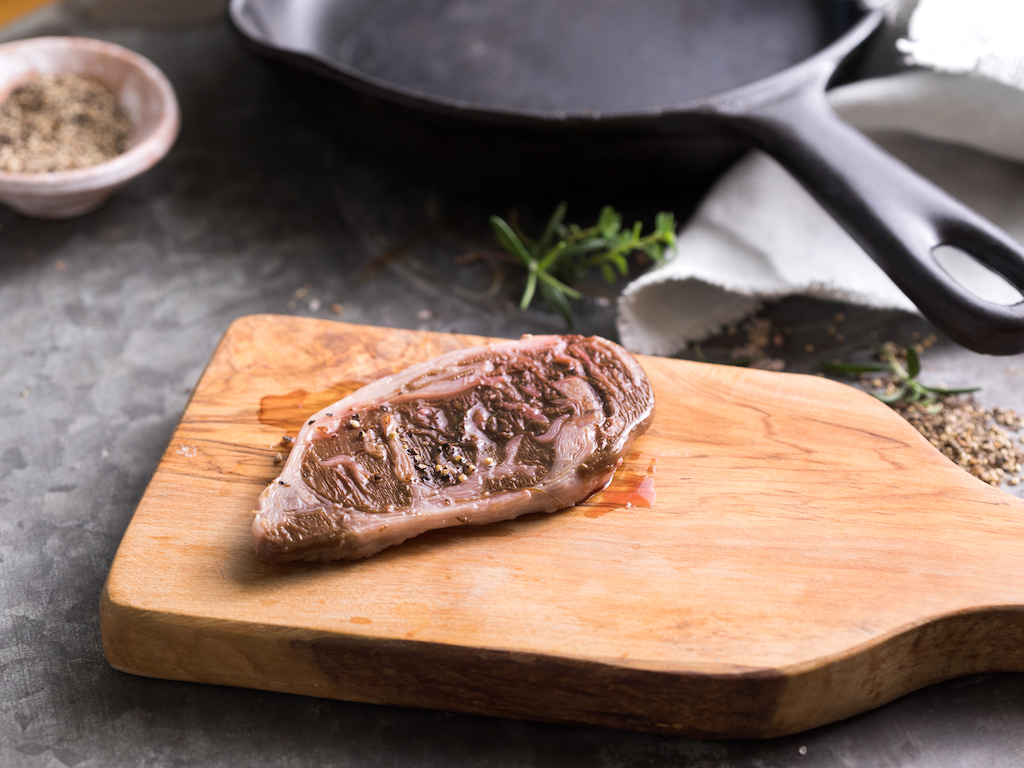3 Mins Read
Israeli food tech Aleph Farms and its research partner Technion of the Israel Institute of Technology, has successfully revealed the world’s first cultivated ribeye steak. The prototype uses 3D bioprinting technology and is grown directly from the cells of cows, without any GMOs or cell immortalisation.
Developed with research partner Technion, Aleph Farms has debuted the world’s first cultivated, slaughter-free ribeye steak using 3D bioprinting and cellular agriculture technologies, the company announced on Tuesday (February 9). The proprietary technology used to grow the ribeye steak, using real cow cells and without any GMOs, marks yet another achievement for the food tech, who has already under its belt a cultured thin-cut steak and is now planning to continue expanding its cultivated meat portfolio.
“The proof-of-concept incorporates real muscle, fat, and vascular-like system similar to a ribeye from a slaughtered cow, in strategy to build a diverse portfolio of cultivated meat cuts of any dimension,” said the Rehovot-based firm in a press statement.

We recognise some consumers will crave thicker and fattier cuts of meat. This accomplishment represents our commitment to meeting our consumer’s unique preferences and taste buds.
Didier Toubia, Co-Founder & CEO, Aleph Farms
Their system enables the “perfusion of nutrients” across thicker tissue, which gives the final prototype a shape and structure that is similar to conventional cuts of ribeye steak, both before and during cooking.
But unlike traditional livestock farming, using cellular agriculture to grow animal meat uses up just a fraction of the resources, is far less carbon-intensive and does not require antibiotics, which experts have warned the overuse of in animal agriculture is threatening a superbug crisis.
“This breakthrough reflects an artistic expression of the scientific expertise of our team. We recognise some consumers will crave thicker and fattier cuts of meat. This accomplishment represents our commitment to meeting our consumer’s unique preferences and taste buds, and we will continue to progressively diversify our offerings,” commented Didier Toubia, co-founder and CEO of Aleph Farms.
Aleph Farms’ latest milestone comes merely two months after it gained the backing of Israeli prime minister Benjamin Netanyahu, who tasted its cultivated steak and toured the startup’s facilities in December 2020 in a strong show of government support for the burgeoning alternative protein industry, which had already been buzzing from the world’s first regulatory approval of cell-based meat in Singapore.

With the realisation of this milestone, we have broken the barriers to introducing new levels of variety into the cultivated meat cuts we can now produce.
Professor Shulamit Levenberg, Technion; Co-Founder & CSO, Aleph Farms
Shortly after, Aleph Farms announced an agreement with Japanese corporate giant Mitsubishi to bring cultivated meat to Japan, signalling the startup’s ambitions to become a leading player in the industry internationally.
Armed with its breakthrough, enabling the food tech to develop thick cuts of cell-based meat, the team at Aleph Farms believes that they will soon be able to expand its portfolio of products and scale and adapt it to different culinary tastes and cuisines around the world.
“With the realisation of this milestone, we have broken the barriers to introducing new levels of variety into the cultivated meat cuts we can now produce. As we look into the future of 3D bioprinting, the opportunities are endless,” explained Professor Shulamit Levenberg of Technion and co-founder and chief scientific advisor at Aleph Farms.
“Additional meat designs will drive a larger impact in the mid and long term,” added Toubia. “This milestone for me marks a major leap in fulfilling our vision of leading a global food system transition toward a more sustainable, equitable and secure world.”
All images courtesy of Aleph Farms / Technion.




